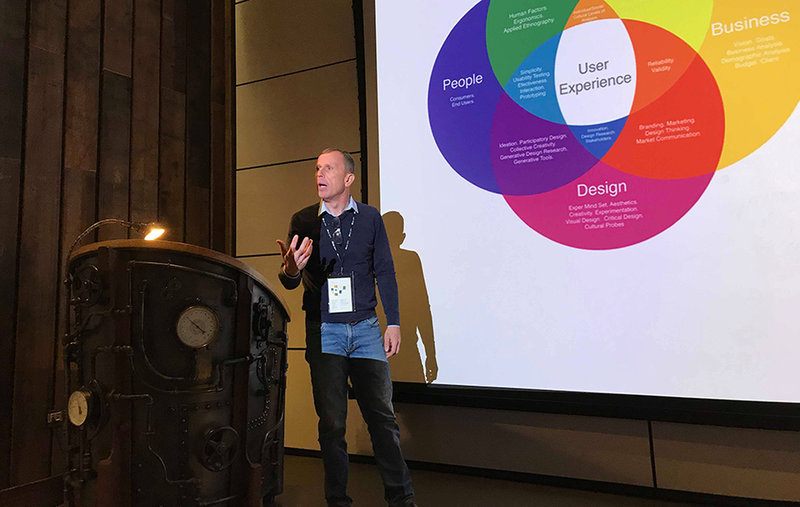Insight CONSTRUCTION
Reimagining construction, transformed by innovation
Scott McGibbon, CEO of Pivotal Consultants and a fellow of the Institute of Innovation and Knowledge Exchange, discusses the potential and challenges the digital transformation is bringing to the construction industry.
The construction sector is often considered less innovative than other industries, due to its project-based character, its predilection to rely on micro and small to medium sized enterprises (MSME/SME) and the lack of-team relationships. However, currently, there is a paradigm shift in thinking by the industry, as it prepares to embrace innovation and development in existing processes and practice, along with the harnessing of the digitisation revolution.
At every level, throughout the whole project lifecycle, we’re seeing an increasing trend of businesses and individuals turning to innovation to help solve the major challenges facing the industry. These challenges range from the fragmented, siloed, and typically adversarial nature of the industry, and the perennial problem of skill shortages, to the need for improved productivity and performance and the move towards more sustainable construction.
Just a quarter of construction projects in the past three years came within 10% of their original deadlines - set against a backdrop of low productivity, rising project complexity, the low margins and constrained finances of the traditional business model, the skills gap, the high amount of waste generated, among other factors.
“
The construction needs to recognise the need to fundamentally evolve the processes, components and systems it utilises, to reduce waste and increase efficiency."
New digital technologies, devices and applications such as BIM, laser scanning and building mapping, together with innovative processes and methodologies such as integrated project delivery and off-site construction models, are making their mark in the building industry.
These changes are propelling the industry towards the vision of two seminal reports, Latham’s ‘Constructing the team’ (1994) and Egan’s ‘Rethinking Construction’ (1998), being realised: to decrease project cost, increase productivity and quality, reduce project delivery time and improve collaboration.
To some extent, it can be argued that the realisation of the improvements recommended by numerous industry reports could not be achieved and sustained unless there was an established culture of research, innovation and development within the industry. The construction needs to recognise the need to fundamentally evolve the processes, components and systems it utilises, to reduce waste and increase efficiency.
The 2016 ‘Farmer review of the UK construction labour model’, provocatively sub-titled ‘Modernise or Die’, recommended that the opportunities afforded from digitisation could offset the risks of continued reliance on labour intensive techniques. Moreover, the report indicated that SMEs have a major role to play in raising productivity through innovation, collaboration and integrated working.
“
Research from KPMG found that the top drivers for innovation and disruption in the construction industry are efficiency, planning and cost reduction."
Digital transformation has long been considered a complicated and sophisticated tool that only massive corporations with highly educated tech professionals can access. However, this is rapidly changing as more affordable, user-friendly and flexible digital tools become available to all kinds of contractors and professionals, particularly SMEs and micro businesses.
Research from KPMG found that the top drivers for innovation and disruption in the construction industry are efficiency, planning and cost reduction. There is an incredible breadth of opportunity for value creation across the entire supply chain, from conceptual design and new materials to construction and maintenance.
Some manufacturers, for example, are already designing products that are reusable or alternatively can be repurposed. Arrangements to incentivise the return of products are starting to emerge.
Yet, currently, there is no clear articulation of exactly how individual businesses and processes will need to change. Whilst many scholars have said that “market demand pulls innovation” and “technology pushes innovation”, two central questions continue to remain unanswered: How do these drivers facilitate construction innovation, and at which levels do they operate?
At the heart of these questions lie the undoubted opportunities provided by user innovation, open innovation, collaborative innovation, and mass innovation. Construction must go digital and embrace new ways of delivering buildings and infrastructure. From strategy to business development, operations, projects, functions, digital technology will touch all of them.
“
Traditional barriers to entry, such as capital, knowledge and efficiencies, will be broken down by digital technologies."
As technology use matures in the industry, business models will also evolve, and new ones will emerge. Traditional barriers to entry, such as capital, knowledge and efficiencies, will be broken down by digital technologies.
Deloitte has aptly named the industry “the case of complex disruption”. This is because not one single technology is responsible for the digital transformation in the construction industry. Rather, it is the convergence of multiple factors that are transforming some of the biggest issues facing construction businesses, such as unproductive sites, time management, safety, talent acquisition, and project management costs.
Ernst & Young reports that digital is specific to each company; however, there are still general trends that have encouraged construction businesses to welcome digital transformation, many of which are strategic, and some of which focus on practical digital tools and systems.
Therefore, the real questions are not the two aforementioned central innovation questions that continue to remain unanswered but, more fundamentally: where will the industry gain most from digital technologies over the coming decade, what are the specific technologies that can bring about these improvements, and how will adoption occur so that companies come out on the right side of this transformation?
